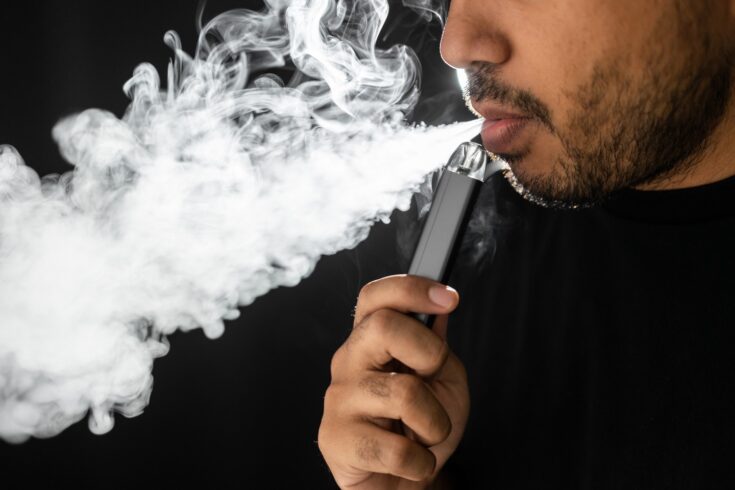Over 200 people from Birmingham will be invited to participate in a research project to consider the benefits and harms of vaping for long term respiratory health.
Studies before it considered effects on lung health at a single timepoint, but this study will examine the effect of long-term vaping on the respiratory system over the course of a year.
The newly funded EVALUATE study has received £1.55 million from the Medical Research Council (MRC), and aims to address unanswered questions about the biological effects of vaping on:
- lung cells
- immune cells
- inflammatory markers and airway microbiome
The participants
In total, 200 healthy smokers will be recruited from the University Hospitals Birmingham (UHB) NHS Foundation Trust’s NHS staff smoking cessation clinic and community smoking cessation service.
Half of the individuals recruited will be seeking to stop smoking using nicotine replacement therapy, such as patches or gum, and the other half will be seeking to stop smoking using e-cigarettes.
A further cohort of 40 never-smokers and never-vapers will also participate.
Samples will be collected over a year to assess lung health.
Immune cells and epithelial cells
Dr Aaron Scott, Associate Professor in Respiratory Science at UHB and chief investigator of the EVALUATE study said:
We will study how vaping affects important airway immune cells and the epithelial cells which line the insides of the lung.
Since these cell types play a critical role in the development of smoking-related lung diseases, these changes will provide clear insight into vaping on lung health.
Critical data to understand the safety of vaping
Professor David Thickett, Professor of Respiratory Medicine at the University of Birmingham, clinical lead for EVALUATE and the Tobacco Addiction Cure team lead at UHB said:
This study will provide critical data needed to understand the safety of vaping as a short-term smoking cessation strategy and the potential for harm in longer-term usage so people can make an informed personal choice about whether to quit with e-cigarettes and how long to use them after swapping to stop.
Complete picture
Dr Dhruv Parekh, Associate Professor in Respiratory Medicine and Director of the UHB Clinical Research Facility said:
Studying immune cells from the blood (indirect effects) and from the airways (direct effects) by bronchoscopy, allows us to get a complete picture of how the airways are affected by vaping.
This important study will be delivered through our NIHR Clinical Research Facility which is integral to the delivery of this work.
Changes to the microbiome
Dr Mike Cox, Assistant Professor Respiratory Microbiome at the University of Birmingham said:
Supported by the NIHR Birmingham Biomedical Research Centre, the multi-faceted study will also investigate how vaping changes the human microbiome after smoking cessation.
Trillions of microorganisms live on and in the human body, interacting with each other in a delicate balance. Smoking can drastically alter this balance and can impact health if disrupted.
This project will allow us to uncover how vaping impacts the airway microbiome and map out how this changes over time.
Understanding the mechanism
The EVALUATE study will investigate how e-cigarettes change gene and protein expression over time.
Mark Lindsay, Professor of Molecular and Computational Pharmacology at the University of Bath, who will oversee the integration of this data said:
Our cutting-edge multi-omics approach will help us to understand at the molecular level, how using e-cigarettes changes immune and epithelial cell recovery after smoking cessation.
Studying toxicants in the airways
Previous work from Dr Scott’s lab at the University of Birmingham has shown that toxicants within e-cigarette vapour, formed by the breakdown of e-liquid, can negatively impact important immune cells, independently to the effects of nicotine.
Some of these toxic components of e-cigarette vapour are also found in cigarette smoke.
We know this could harm our airways, but this is difficult to sample and measure.
Powerful insight into the effects on airways
Professor Luis Mur at Aberystwyth University will lead the investigation into the accumulation of toxicants within the airways after vaping. Professor Mur said:
Using our cutting-edge mass spectroscopy platforms, we can monitor how toxicants in the airways change as people move from smoking to vaping.
Combined with data on immune cell function, this interdisciplinary approach will give us a powerful insight into the true nature of e-cigarette exposure on the airways.
The research team will begin recruiting for the EVALUATE study in the autumn of 2025.
Further information
Anyone wishing to participate in the study should contact the UHB NHS staff smoking cessation clinic by emailing tobaccoadditctioncureteam@uhb.nhs.uk
Find out more about NHS stop smoking services.

